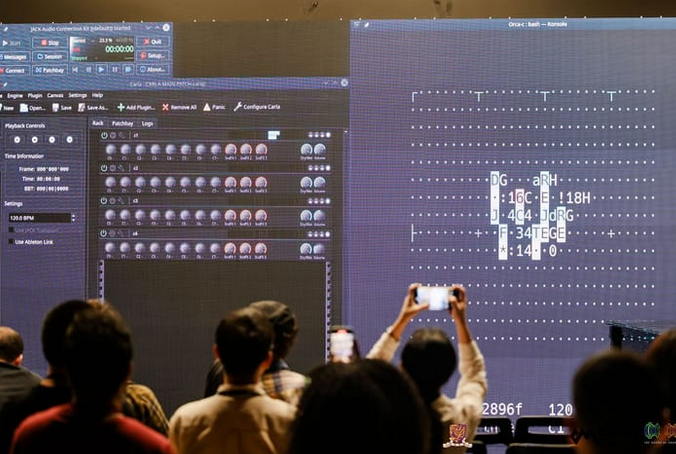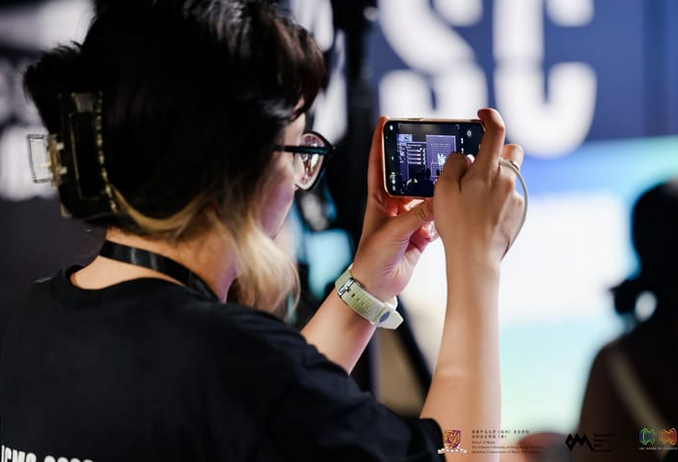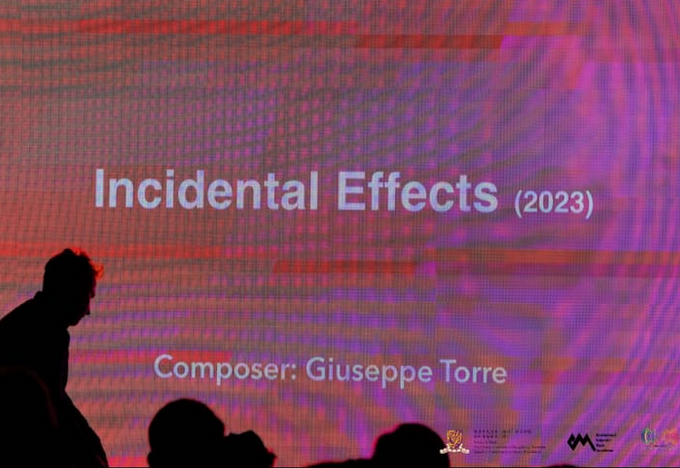Stochastic Resonance Press Release
Stochastic Resonance is extremely proud to welcome in its roster of artists handsandnumbers, the brainchild of Giuseppe Torre, Associate Professor of digital art practices at the University of Limerick.
Incidental Effects is, in its very purest essence, a data-driven punk statement. It is extremely raw, uncompromising, fist-in-the-face, brutal; it is chaotic yet controlled, groovy but impossible to dance to. It strongly relates to the algorave scene, but it kills the rave-vibe by hitting you with so many questions. And it leaves you wanting to know more about the whole thing. It’s basically contemporary philosophy, masked as music.
Each of the 3 “songs” is a semi-improvisation created for 1 single synth sound. The 3 different sounds are manipulated live through an ORCA software patch that contains minimal available commands. The improvisation is structured and confined by numerical parameters. The work is an exploration of the non-obvious, yet ubiquitous, relationship between individual choice and operation/performance, within the digital domain.
Incidental Effects is a striking work because in its small time-lapse, it manages to raise some of the most fundamental questions in art, philosophy and music. Who chooses what is art? What makes a performance beautiful vis-à-vis what defines a performance to be wrong? Would the same concepts be possible without a given medium? And many more.
To put it in Giuseppe’s words:
"Incidental Effects explores the displaced relationship between numbers and self. To what point will I recognize the unequivocal trace of my gestures once I transcode them through logical operators into digital-quantitative entities – i.e. numbers – literally “through the hands” of digital technologies? If all of our digital actions and interactions undergo a numerical transcoding via a gestural spatio-temporal segmentation, should we then think that the only traces left of ourselves are numerical traces?"
Can a live performance condition and its extemporaneous character, ever so gently alleviate the above paradox, that literally defines every work of digital art practitioners?
Incidental Effects is centered around the utilization of minimal technology and sonic material. By minimizing technology and constraining sonic possibilities, the intent is to maybe enhance chances for the ownership of our own gestures.
Academic Statement
Incidental Effects is a tripartite live coding performance that critically examines the entanglement of numerical abstraction and human subjectivity in the digital age. In a cultural landscape increasingly defined by datafication—where every gesture, interaction, and expression is rendered into quantifiable metrics—this work poses a fundamental question: what remains of the human trace when our actions are perpetually transcoded into numbers?
The performance unfolds through the ORCA live coding environment, utilizing a minimalist sonic palette composed of a single synthesizer voice per section. Each part is structured around real-time manipulation of numerical parameters, producing a soundscape that is intentionally raw, rhythmically unstable, and sonically abrasive. The aesthetic is one of digital brutalism: a refusal of polish, a resistance to seamlessness, and a deliberate embrace of noise, repetition, and constraint. Technically, the work is realized entirely with free and open-source software, including Carla, SurgeXT, and ORCA. This choice reflects a commitment to transparency, accessibility, and critique of proprietary systems. Conceptually, the performance operates at the intersection of algorithmic composition and philosophical inquiry. It explores the paradox of authorship in computational environments—where the artist exerts control through code, yet is simultaneously constrained by the logic of the system.
By reducing the technological apparatus to its bare essentials, Incidental Effects foregrounds the performative labor of coding as an expressive act. The improvisational structure resists the determinism often associated with algorithmic systems, asserting instead a space for spontaneity, error, and affect. In this tension between structure and freedom, the work articulates a nuanced critique of digital abstraction while simultaneously reclaiming it as a site of creative agency.
Philosophically, the performance draws on post-structuralist and phenomenological frameworks to interrogate the limits of representation, the role of the subject in systems of control, and the potential for resistance within computational logic. It asks whether the live, ephemeral nature of performance can momentarily disrupt the rationalizing tendencies of data-driven culture, and whether the act of coding—when made visible and audible—can serve as a medium for critical reflection. Incidental Effects is thus both a sonic experiment and a philosophical provocation. It challenges audiences to reconsider the aesthetics of digital performance and the politics of computation, offering a space where code becomes not only a tool of production but a language of critique.
Artist Statement
Incidental Effects is a live coding performance that explores the paradox of self-expression in a world governed by numbers. As a digital art practitioner, I am constantly confronted with the question: to what extent can I still recognize the trace of my gestures when every action is translated into logical, quantitative entities—into numbers—by digital technologies?
This work is my response to that question. It is an attempt to reclaim authorship and immediacy through the constraints of minimalism. Each of the three parts of the performance is built around a single synth sound, manipulated live within a structured improvisational framework. The tools I use—Carla, SurgeXT, ORCA—are all free and open-source. The aesthetic is raw, algorithmic, and noisy. It is a data-driven punk statement: uncompromising, chaotic, and fiercely deliberate.
By reducing the technological and sonic palette, I aim to enhance the ownership of gesture. The performance is not about virtuosity or spectacle. It is about presence. It is about the tension between control and unpredictability, between the algorithm and the body. It is about asking whether the live, extemporaneous nature of performance can momentarily disrupt the logic of digital abstraction.
Incidental Effects is not just music. It is a philosophical act. It is a refusal to let the digital fully define us. It is a space where numbers are bent, broken, and made to speak—if only for a moment—in a human voice.


